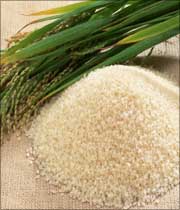The central pool of food grains is insufficient to provide for families above the poverty line who are covered by the Targetted Public Distribution System, if they are to be all included in the proposed National Food Security Act, show data from the Planning Commission.
 Food security for all was a poll promise from the ruling Congress party before this year's general elections. The proposed law is aimed to entitle every family below the poverty line to 25 kg of rice or wheat a month at Rs 3 a kg, but there have been demands for inclusion of APL families in the scheme, too.
Food security for all was a poll promise from the ruling Congress party before this year's general elections. The proposed law is aimed to entitle every family below the poverty line to 25 kg of rice or wheat a month at Rs 3 a kg, but there have been demands for inclusion of APL families in the scheme, too.
The minister for food and agriculture, Sharad Pawar, had assured the Rajya Sabha last month that the government would follow an inclusive policy in which both APL and BPL families would get foodgrains at cheaper rates. The issue is particularly on including APL families who come under the TPDS - roughly a fifth of all APLs.
However, Planning Commission estimates reveal even such limited inclusion of APL families is not viable and only an enabling provision could be made, to give food security to these families depending on availability of stocks in the central pool.
The total annual requirement of foodgrain would be around 40 million tonnes, assuming (as done by the Commission) BPL allocations at 25 kg a month and APL allocation at 11.72 kg. The average procurement in an average year by the government is assumed at 40-41 mt, which is shared with three other similar welfare schemes, besides the targetted public distribution system.
Therefore, the amount left for food security is insufficient to provide for both APL and BPL families. "The estimates have been worked out as part of the groundwork for the proposed Food Security Act," said a senior official.
More, the figure of 40 mt required for food security is a moderate estimation. For, it takes into consideration only 65.2 million BPL families, while there are actually 108.6 million BPL cards issued by state governments.
Adding to this, a government committee headed by veteran economist Suresh Tendulkar estimates poverty as covering 38 per cent of the total population, against the government estimation of 22.7 per cent.
Delhi, Uttar Pradesh and Haryana have separately proposed transfer of food subsidy in cash directly to BPL families as a pilot programme.







 © 2025
© 2025